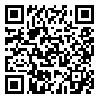BibTeX | RIS | EndNote | Medlars | ProCite | Reference Manager | RefWorks
Send citation to:
URL: http://jdisabilstud.org/article-1-3000-en.html
2- Assistant Professor, Department of Psychology, West Tehran Branch, Islamic Azad University, Tehran, Iran
3- Assistant Professor, Department of Psychology, Payam Noor University, Tehran, Iran
Abstract
Background & Objectives: Intensive care unit (ICU) nurses experience more stress than nurses in other units. They are at higher risk regarding health and psychological well–being than nurses in other units. This issue affects the vital aspects of their performance. Cognitive emotion regulation is one of the psychological factors that can potentially improve people's health and performance in different work settings. Emotions play a significant role in solving problems, processing information, and analyzing it. Emotion regulation how people change their reactions to emotion expression time. Emotion regulation plays a key role in the normal transformation and health of people. Weakness in emotion regulation skills significantly causes psychological problems. Schemas are one of the factors affecting the lack of emotion regulation in people. Yang proposed schema therapy to change them. Thus, the present study aimed to evaluate the schema therapy's effectiveness on the cognitive emotion regulation of ICU nurses.
Methods: This quasi–experimental research has a pretest–posttest and a two–month follow–up design with a control group. Its statistical population included all nurses working in the intensive care unit of Shohada Tajrish and Shahid Taleghani hospitals in Tehran City in 2021. We conveniently selected 40 nurses for the study based on inclusion and exclusion criteria and then randomly divided into the experimental and control groups. The inclusion criteria were as follows: willingness to participate in the research and providing informed consent, employment for at least one year in the special care department, not doing psychological treatment or not participating in other educational sessions at the same time, not taking certain medications, lacking The stressful events, such as divorce, death, etc. in close relatives in the last six months, obtaining a lower than average score (average score=72) in the Cognitive Emotion Regulation Questionnaire (Garnefski et al, 2001). The exclusion criteria were as follows: unwillingness to continue cooperating with the research, not attending more than two consecutive sessions out of 11 educational sessions, and unwillingness to do homework. The experimental group received eleven 75– to 90–minutes sessions per week of schema therapy. The control group did not receive any intervention. The data collection tool was the Cognitive Emotion Regulation Questionnaire (Garnefski et al., 2001) in three stages of pretest, posttest, and follow–up for two groups. The obtained data were analyzed using descriptive statistics, including mean, standard deviation, and inferential statistics, including repeated measures analysis of variance and Bonferroni post hoc test in SPSS software version 25. The significance level of statistical tests was set at 0.05.
Results: The effects of time (p<0.001), group (p<0.001), and the time and group interaction (p<0.001) on cognitive emotion regulation were significant. In the schema therapy group, the cognitive emotion regulation scores increased significantly in the posttest compared to the pretest (p=0.001). Also, in the schema therapy group, no significant difference was observed between the posttest and follow–up stages regarding the variable of cognitive regulation of emotion, which indicated the lasting effect of the intervention in the follow–up stage (p=0.986).
Conclusion: According to the findings, schema therapy improves the cognitive emotion regulation of intensive care unit (ICU) nurses. Therefore, this treatment approach can be used as an effective intervention to improve the nurses’ emotional regulation and psychological health.
| Rights and permissions | |
 |
This work is licensed under a Creative Commons Attribution-NonCommercial 4.0 International License. |



